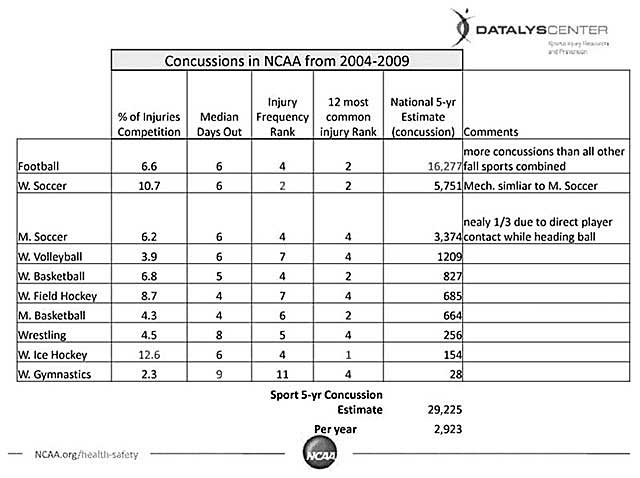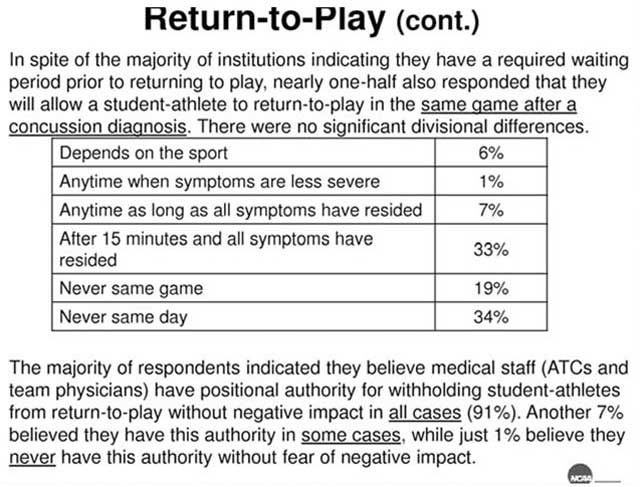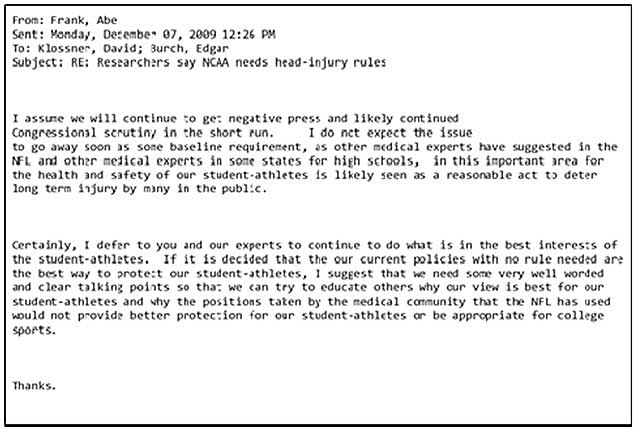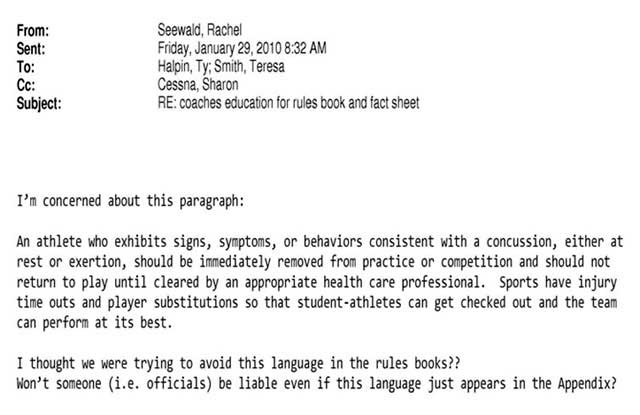The NCAA held a concussion summit in April 2010. It opened the conference with a talk about the concussion rates at NCAA schools and distributed the results of a concussion survey to those in attendance -- including some of the organization's top medical executives. The results of the survey were dismaying, and -- in light of a lawsuit alleging negligence over concussions by the NCAA -- potentially damaging, to say the least.
The survey was effectively a concussion questionnaire sent to all member programs. Its purpose was to focus on how schools were handling concussions. Specifically: Were they performing more intricate concussion testing, commonly called baseline testing? The first disappointment to organizers of the survey was the number of respondents -- the survey was sent to every head athletic trainer at every NCAA school, but only 48 percent responded.
Also, only 66 percent of the schools performed baseline testing. More than 170 schools did not require this testing for several reasons, including cost, inconvenience, too much time to administer the testing, lack of qualified medical personnel to administer the testing and "lack of support from coaches/administrators."


The survey was done only three years ago.
The information comes from hundreds of pages of documents stemming from a concussion lawsuit against the NCAA. The documents, reviewed by CBSSports.com, are a combination of public information and never-before-seen NCAA internal memos and emails.
If the NFL did not know about these documents, it does now, and it's likely the documents will work their way into the bloodstream of the litigation stemming from the more than 4,000 players suing the NFL over its handling of concussions.
Plaintiffs suing the NCAA in this high-profile concussion case make the argument the NCAA knew of the dangers of concussions long ago but didn't act properly to protect players. As a result, players suffered unnecessarily because of concussions. The NCAA denies this.
"Student-athlete safety is one of the NCAA's foundational principles," spokeswoman Stacey Osburn said in a statement. "The NCAA has been at the forefront of safety issues throughout its existence."
But the NCAA's own internal emails at times tell a different story. One exchange shows some treating the concussion issue as joke material. NCAA staffers, documents show, mocked David Klossner, the NCAA's director of health and safety.
"Dave is hot/heavy on the concussion stuff," wrote Ty Halpin, the director of playing rules administration. "He's been trying to force our rules committees to put in rules that are not good -- I think I've finally convinced him to calm down."
? "He reminds me of a cartoon character," responded Nicole Bracken, the associate director of research.
? "HA!" Halpin responded, "I think you're right about that!"
Halpin later would testify that the NCAA's concussion plan is "toothless."
The NFL presumably could say that concussion problems for players started in college, not the NFL, and there are NCAA documents to prove it.
At the very least, the NCAA information possibly muddles even further the already complicated NFL concussion litigation.
Since the NCAA essentially serves as the NFL's minor league, the NFL could possibly be in an awkward position of attacking its feeder system.
There is a great deal of potential material for the NFL to use. In one part of the NCAA concussion court filings, the plaintiffs discuss an NCAA-commissioned study, authored by several experts, to examine how long concussed athletes were being kept out of games and practice.
The court documents state "the study explained that cognitive deficits took up to seven days to resolve," as "athletes required a full 7 days for postconcussive symptoms to completely return to baseline and control levels."
The document continues: "Given such findings, the authors suggested a pattern of premature return to play at NCAA member institutions, stating: We previously found that the largest percentage of collegiate football players were withheld from competition for an average of less than 5 days after concussion. The disparity between our data on average recovery time and concurrent reports on time withheld from play after concussion raises concerns based on the common assumption that resuming competition before reaching full recovery may increase the risks of recurrent injury, cumulative impairment, or even catastrophic outcome."
The plaintiffs state the NCAA ignored these findings.
In another example, an internal email exchange between several NCAA officials indicates that the NCAA's concussion testing methods were not up to par with the NFL's. And the NCAA knew it.

When some in the NCAA wanted to strengthen concussions rules and put those rules in the NCAA rules book, NCAA emails show some in the NCAA were concerned about things other than the health interests of the athlete. An email exchange between several NCAA officials:

Teresa Smith, the assistant director of playing rules administration, asks in another internal email if inclusion puts both officials and the NCAA at risk.
"Are the refs more at risk if we don't provide the educational piece on concussions or if we do provide it?" she asks in an email. "And, what about the NCAA? Would we be protecting/helping the organization by not providing the information?"
"Thus, it was clear the Playing Rules Administration and the Playing Rules Oversight Panel," the lawsuit states, "were more concerned with liability for the NCAA and its own members than the safety and welfare of the student-athletes."
That allegation is something the NFL could use in its own concussion defense strategy.
American flag Happy 4th of July Laura Elizabeth Whitehurst al jazeera Armie Hammer Aaryn Gries Cop Shoots Dog
No comments:
Post a Comment
Note: Only a member of this blog may post a comment.